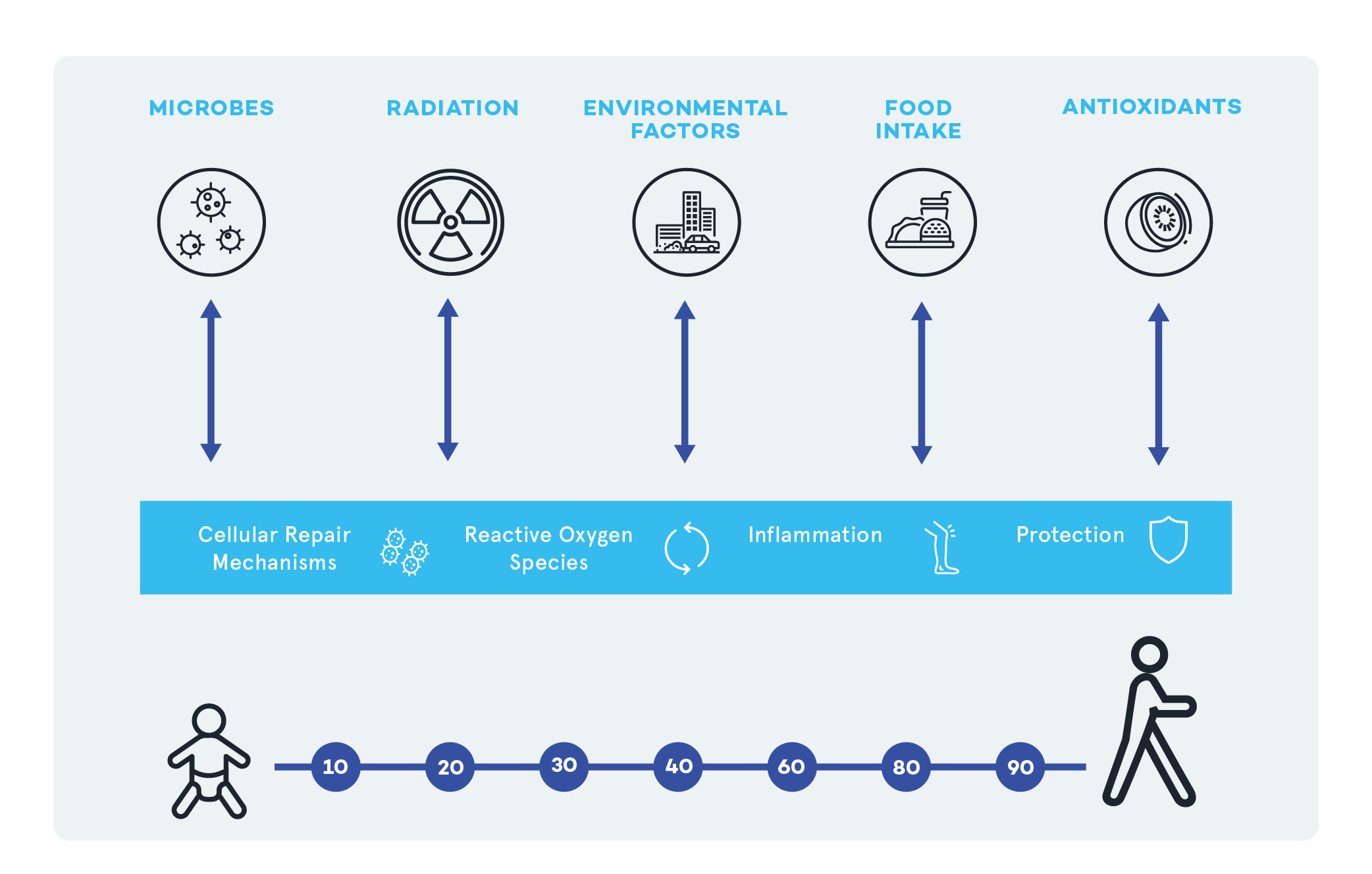Here is a secret about aging almost no one in mainstream health circles talks about:
Aging isn’t unavoidable. You can grow older healthfully.
This piece of information might raise more questions and eyebrows than it gives you answers. You might be thinking:
Does that mean we can stay young forever? I don’t buy it.
But so many illnesses arise in old age. Can that really be stopped?
I know we can’t stop the clock. So, what do you mean by “aging”?
We completely get that questions about aging are accented by doubt and confusion. Staying healthy as we grow older is not an easy puzzle to solve.
No, we’re not going to try to sell you a miracle formula that promises access to the fountain of youth.
While billions of dollars have been invested into designing and building technology to help stop, and even reverse aging, we mustn’t forget that this technology has only been able to come about after billions of dollars were invested (and continue to be invested) into research about the science of aging.
While some of that truth may lead to the development of a product that promises to make your wrinkles disappear, most of it gives us insight about how our lifestyle choices can impact the speed at which our body’s cells age.
Aging can be slowed down significantly and even reversed.
Why the Big Secret?
Much of the world is convinced that aging is unavoidable and will surely lead to illness. We’ve come to accept that aging equates to disease, but as we will explore throughout this article, research has revealed that this is not the case.
So, if so much research exists about the science of aging and how to slow, and even reverse aging, then why do we still think that aging is a fact of life?
First, so much research about longevity and anti-aging is very new. In fact, some of the most cutting-edge research about longevity and aging was only uncovered in the past few years. In fact, just in 2019, the Harvard Medical School established a nonprofit called the Academy for Health and Human Life Research dedicated to carrying out and harnessing information about how to extend the human life span.
So, when hundreds of human generations have experienced a life where with old age comes illnesses, and those illnesses were the cause of their deaths, it’s not easy to wrap our head around the idea of growing older without getting sick.
Second, the anti-aging product industry is HUGE. It is estimated that the anti-aging market was worth a whopping 50.2 billion USD in 2018 and is on the rise. This means that there are thousands of companies who want you to believe that the only solution to slowing or reversing aging is by using their product or service. This is not to say that anti-aging products and services they offer don’t work. In fact, many of these are based on anti-aging research. However, there are other modifiable factors, like lifestyle choices, that have a significant influence on the speed of aging, that many of these companies aren’t interested in you knowing about.
Finally, there is some confusion between the meaning of aging from a biological perspective and “growing older.” We’ll go further into detail about this point in the section below titled “Six Truths about Aging.”
Why Is Information about Aging Relevant to a Health and Wellness Professional?
Aging is about much more than the appearance of wrinkles on our face. Aging is a phenomenon that affects every single cell in our bodies and has a direct impact on our health. In fact, from a biological perspective, aging goes hand in hand with illness.
So, as a health coach, there are two clear ways in which information about aging and longevity is relevant to you.
- Increasing your knowledge about aging and its relationship with health empowers you to understand how and why the choices your clients make can prevent, stop the advancement of, or reverse certain illnesses.
- You can also integrate a focus on longevity into your service offerings. As a health coach, you can work with your clients to integrate key actions into their daily choices to reduce their risk of age-related chronic illnesses, like diabetes, arthritis, and colitis, and keep their immune system strong as they grow older. This will ensure that their bodies are equipped to renew damaged cells and replace dead ones. Additionally, many of these actions also have an impact on skin health, agility, strength, and muscle mass—all factors that play into some of the more obvious signs of aging.
As a health and wellness coach, you have the authority to approach aging and longevity from a preventative health perspective. You can help your clients understand that the choices they make have a direct impact on how long they will live healthfully (and how long they will live, period) and work with them to make choices that will increase their health and lengthen their lives.

Get Your Free Guide
Learn How to Start a Fulfilling, Impactful Career as a Holistic Health Coach
You’ll learn:
- Why holistic health matters
- If holistic health coaching is right for you
- What career opportunities exist for health coaches
- And more!
The Science of Aging and Longevity
Our body is made up of hundreds of billions of cells, where the aging process begins. The health of each cell is controlled by multiple processes, where their goal is to recycle and renew organelles (parts of the cell) and ensure healthy signaling.
As a cell ages, it can no longer keep up with repairing cellular and DNA damage, so quality control mechanisms aren’t as effective. As a result, they become less healthy and begin to lose their function. If these cells aren’t removed or replaced in time, they become the source of disease development.
In people who are not yet significantly affected by the effects of aging, the cells are replaced and renewed. This is normal, as cells have a finite life span.
So, why does aging occur? There are three main theories of aging: program theory, damage theory, and combined theory.
Program theory
Programmed aging is perhaps the theory that most closely equates growing older with aging. The theory argues that our bodies deliberately deteriorate with age so that humans can have a limited life span. The argument is that limited life spans for individuals have evolutionary benefits for the human race. Supporters of this theory would not agree with the increased investment in technology that slows aging, arguing that extending the life span beyond natural cell occurrences is anti-evolutionary.
Damage theory
The damage theory of aging is among the most popular theories of aging and has the most scientific support. This theory argues that aging results from the accumulation of oxidative damage to the cells and organs. In this sense, aging isn’t programmed but rather the result of exposure to toxins (caused by the environment and lifestyle) and the inability of the body to effectively neutralize the free radicals (genetic factors). These changes give way to fundamental system changes or mutations, which can lead to inefficiencies, illness, and disease.
Since this theory takes modifiable factors into account, under this theory, aging speed and intensity can be modified.
Here is a visual summary of the different external and internal factors that affect aging according to damage theory:

Combined theory
Combined theories of aging focus on what happens to the cell structure as we age, arguing that aging is not a chemical process but rather a more mechanical process that results in fundamental changes in the structure of the cell. This theory suggests that, as a result of these structural changes, like the rigidity of the cell wall, the functional changes, like the ability of electric pulses to be transferred across the cell wall, are also modified.
While knowing the theories of aging may not be directly relevant to your practice as a health and wellness professional, understanding the basis of the theories will help you to understand the different approaches to slowing or reversing aging.
Note that, because damage theories of aging are the best supported by research, the information and recommendations in this article are based on accepting this theory.
Six Truths about Aging
Before we get into the science of aging, it is important to understand some key concepts and ideas around longevity. These six “truths” will clear up much of the confusion.
Growing Older Is Not the Same as Biological Aging
From a biological perspective, aging refers to the rate at which cells deteriorate and die without being renewed or replaced. It is the outcome of a balance between cell damage and cell repair. In other words, under different conditions, this type of aging is modifiable.
Cellular aging is different from growing older, which we mean to refer to how long we’ve been on this planet. Obviously, we cannot fight time from moving forward, but biological processes, like aging, can be altered depending on the conditions in which they find themselves.
Aging Is Not Just about Wrinkles
Our society has become increasingly fixated on hiding or erasing the visual effects of aging, like wrinkles, lack of skin tautness, age spots, and grey hairs, among others.
These are, indeed, the effects of cell aging. However, note that the processes that cause some of the visual effects of aging are the same processes that affect our internal organs, our metabolism, our immune system, and our ability for our cells to renew themselves.
In other words, the visual effects of aging are only skin deep, but they tend to get most of the attention. The aging that affects the internal workings of the body can have a much more profound effect on our health. But, since we don’t see them in the mirror every day, they tend to get much less attention and often go unnoticed until the problems are diagnosable, and, sometimes, irreversible.
So, how do we take this truth to heart to help make better decisions for our health? Health coaches can take a more holistic approach to promote health as we grow older by understanding the factors (explained ahead) that determine why, how, and how fast our cells age and what we can do to promote health.
Life Span Is Not the Same Thing as Health Span
Health span is a relatively new word, but the concept is as old as is human interest in staying healthy. Life span is the amount of time in your life that you live—from birth to death. However, life span doesn’t take into account the proportion of those years you are healthy.
Health span, on the other hand, refers to the length of time we are healthy, not just living. Some sources attribute the coining of the term to Dr. David J. Waters, the Executive Director of the Gerald P. Murphy Cancer Foundation, whose research examines the intersection of the fields of aging and cancer. Health span is closely related to the quality of life.
Why is this difference important? When you are unhealthy, affected by chronic diseases that cannot be cured, it is much more difficult to live fully. Chronic diseases are often accompanied by pain, discomfort, lack of mobility, mental illness, and more, all of which have a negative impact on your overall wellness.
Let’s take an example. Patricia Jenkins just turned 100 years old, but she has been battling type 2 diabetes and chronic hypertension since she was 35 years old. Both of those conditions have had a significant effect on her self-esteem and mental health, and most days she feels ill.
Peter Marquez just celebrated his 70th birthday, and he is proud to say that, except for a few bouts of the flu here and there, he has had a perfectly healthy life.
It is safe to say that while Patricia Jenkins has had a longer life span, Peter Marquez has had a longer health span. Thus, Peter has had a much better quality of life.
We Can Age Healthfully
Is there a limit to the human life span? How long do you think humans can live? 100 years, 110 years, 120 years?
Most of us tend to relate growing older with getting ill and eventually dying of that illness. It is true—the risk of most chronic illnesses grows significantly over time. However, illness is avoidable, as discoveries have uncovered how to postpone or prevent the onset of diseases associated with growing older.
This truth is so powerful that some researchers question our assumptions about the maximum human life span. Researchers from the Center for the Economics and Demography of Aging at the University of California published an article that says as follows:
Until now, the assumption that the maximum human life span is fixed has been justified. Recent advances in cell biology, genetics, and our understanding of the cellular processes that underlie aging, however, have shown that this assumption is invalid in a number of animal models and suggest that this assumption may become invalid for humans as well.
In other words, recent research is actually questioning our assumptions for how long humans can live healthfully. As we crack the codes related to how we age, who knows, human life expectancy may double (meaning we would be able to live past 150 years old) just like it did between 1850 and 2000!
Genetics Have a Lot to Do with Aging, Too
Genes play an important role in your body’s ability to neutralize free radicals, renew cells, and remain healthy throughout your lifetime. If your grandparents on both sides lived past their 90s and had minimal health issues, you likely have the genes of longevity.
For example, while research carried out with nonagenarians (people in their 90s) and centenarians (people past 100) show that they attribute their long lives to healthy habits, their siblings and children are also likely to remain healthy for longer than their peers. Even if they do develop age-related diseases like cancer, heart disease, and type 2 diabetes, they tend to come up much later in life.
This is also true in the other sense. If premature aging is common in a family line, it is more likely that siblings and children will be vulnerable to premature aging as well, since the code may be embedded in the DNA.
The role of genes is so important in longevity that researchers have discovered multiple gene mutations that extend life span in organisms.
Genes don’t paint the whole picture, however. The environment you live in and the lifestyle choices you make are also essential to capitalizing on your likelihood to live longer without health issues.
Lifestyle Choices Are Key Influencers of How Fast We Age
“Aging well” is not only a matter of having good genes. There are several environmental and lifestyle factors that influence how and when our cells age. Eating well, avoiding toxins, and exercising are just some of the key factors that influence the speed and severity at which we age.
Making choices starting early on in our lives and on a daily basis that promote cell preservation and renewal will help slow down aging significantly.
Research shows that these six lifestyle choices can significantly improve your health span as well as your life span.
- Don’t Overdo Food: Plenty of research has gone into the effect of calorie restriction on longevity in animals. While the models scientists use can vary between different intermittent fasting models to restricting daily calorie intake over the long term, the conclusions are the same: restricting energy intake (but meeting micronutrient needs) significantly lengthens the life of animals in the studies.
- Don’t Get Over-Stressed: While some level of stress is inevitable and even healthy, chronic stress has a deep effect on the body’s immune response and ability to renew damaged cells. In fact, the rate of aging and the development of age-related illnesses are modulated by stress response pathways. While healthy levels of stress can lengthen the life span, chronic stress can damage stress response and cell repair pathways, promoting chronic illness and reducing life span.
- Exercise: Even moderate exercise can help to neutralize free radicals in the body, boost the body’s natural immune system, and even promote the growth of new brain cells. One study shows that even fifteen minutes of exercise a day helped to lengthen life span by two years!
- Sleep: Humans have known about the importance of sleep for our health as far back as Hippocrates’s times. People who get at least seven hours of sleep have lower body weight and BMI and have a lower risk of diabetes and heart disease.
- Follow a Plant-Based Diet: For decades, physicians have been juggling research on the most effective eating patterns to reduce the risk of chronic disease. Recently, some groups of physicians who were dedicated to systematically reviewing hundreds of research papers concluded that plant-based diets are a cost-effective way to lower the risk of high BMI, blood pressure, HbA1C, and cholesterol levels. They may even reduce the mortality rates of people with certain types of heart disease.
- Consider Supplements: Recently, plenty of research has gone into identifying components that can help to slow or reverse aging from the inside out. These components are packaged in pill or powder form and taken regularly. Some examples include antioxidant N-acetyl-L-cysteine, which might be effective when premature aging is due to a specific protein deficiency; phosphatidylcholine, which may help improve the cognitive effects of aging; and resveratrol, which may mimic the effects of caloric restriction on the aging process of cells. The effectiveness of these supplements varies, and some only work for specific causes of aging, so make sure to consult with your physician before starting a supplement regimen
Main Takeaways
As a health coach, you want your clients to adopt lifestyle habits that promote health in the long term. Even if you don’t think of it in this way, you are promoting a lengthened health span as well as a lengthened life span.
Even though there are genetic factors that influence the rate of aging, lifestyle and environmental factors are modifiable and, if they are adopted over the long term, they can significantly boost your body’s ability to renew cells and remove damaged cells.
It is possible that you are already promoting some or all of these lifestyle choices in your professional practice. The research summarized in this article about aging and longevity gives those recommendations an even deeper purpose: Not only are you helping clients to have a healthier life from the day-to-day, but you are also helping them to live longer, healthier lives.

Get Your Free Guide
Learn How to Start a Fulfilling, Impactful Career as a Holistic Health Coach
You’ll learn:
- Why holistic health matters
- If holistic health coaching is right for you
- What career opportunities exist for health coaches
- And more!



